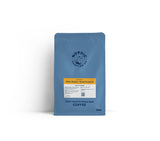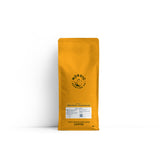Origin: Piendamó, Cauca, Colombia
Altitude: 1,950 m.a.s.l.
Producer: Wilton Benítez | Granja Paraíso 92, La Macarena
Process: Controlled fermentation + thermal shock
Variety: Chiroso
SCA Score: 91.75
Roast Degree: Light
Tasting Notes: Cardamom, Thyme, Nectarine
From the highlands of Cauca, Colombia, come some of the most distinctive specialty coffee lots crafted by Wilton Benítez. With over 26 years of experience, Wilton merges his background in chemical engineering with a deep passion for coffee, creating unique fermentation processes that elevate each bean to its fullest potential.
Innovative Processing
Anaerobic fermentation & thermal shock
Once the coffee cherries are fully ripe, they are carefully handpicked and sorted for quality based on size and density. The cherries then undergo two stages of sterilization:
- First, they are washed with ozonated water.
- Second, the cherries are exposed to ultraviolet (UV) light.
The cherries are then subjected to two fermentation phases:
- First phase: Anaerobic fermentation in cherry form for 72 hours at a temperature no lower than 18°C. This process takes place in stainless steel bioreactors, which allow for precise control of pressure, lowering Brix to 6 and pH to 3.8. During this phase, the mucilage is recovered and reserved for reuse in the next stage.
- Second phase: After depulping, the mucilage-covered beans are placed again in bioreactors for another 54 hours of anaerobic fermentation at temperatures above 21°C.
The beans are then washed using a thermal shock process:
- First wash: hot water (38–40°C)
- Second wash: cold water (approx. 12°C)
This rapid change in temperature locks in the aromatic compounds developed during fermentation and serves as an additional sterilization step.
Finally, the beans are dried using an eco-friendly drying system that controls temperature and recovers water from the dehydration process. Drying takes approximately 36 hours:
- First 12 hours at 40°C
- Next 24 hours at 35°C
Once the beans reach a moisture content between 10–11%, they are moved to the storage facility for manual and electronic sorting, ensuring the physical standards of specialty coffee are met. Only after this do the samples undergo cupping and quality control in the lab.
By using bioreactors, innovative drying systems, farm-developed microorganisms, and closely monitoring variables like temperature, pH, Brix levels, and electrical conductivity, Wilton produces remarkably balanced coffees with vibrant tropical fruit notes – including passion fruit, lychee, pineapple, tamarind, and coconut.
Our packaging is made of 100% recyclable plastic.




